Angela Bonifati
Continuous Fairness On Data Streams
Jan 13, 2026Abstract:We study the problem of enforcing continuous group fairness over windows in data streams. We propose a novel fairness model that ensures group fairness at a finer granularity level (referred to as block) within each sliding window. This formulation is particularly useful when the window size is large, making it desirable to enforce fairness at a finer granularity. Within this framework, we address two key challenges: efficiently monitoring whether each sliding window satisfies block-level group fairness, and reordering the current window as effectively as possible when fairness is violated. To enable real-time monitoring, we design sketch-based data structures that maintain attribute distributions with minimal overhead. We also develop optimal, efficient algorithms for the reordering task, supported by rigorous theoretical guarantees. Our evaluation on four real-world streaming scenarios demonstrates the practical effectiveness of our approach. We achieve millisecond-level processing and a throughput of approximately 30,000 queries per second on average, depending on system parameters. The stream reordering algorithm improves block-level group fairness by up to 95% in certain cases, and by 50-60% on average across datasets. A qualitative study further highlights the advantages of block-level fairness compared to window-level fairness.
Discovering Communities in Continuous-Time Temporal Networks by Optimizing L-Modularity
Oct 01, 2025Abstract:Community detection is a fundamental problem in network analysis, with many applications in various fields. Extending community detection to the temporal setting with exact temporal accuracy, as required by real-world dynamic data, necessitates methods specifically adapted to the temporal nature of interactions. We introduce LAGO, a novel method for uncovering dynamic communities by greedy optimization of Longitudinal Modularity, a specific adaptation of Modularity for continuous-time networks. Unlike prior approaches that rely on time discretization or assume rigid community evolution, LAGO captures the precise moments when nodes enter and exit communities. We evaluate LAGO on synthetic benchmarks and real-world datasets, demonstrating its ability to efficiently uncover temporally and topologically coherent communities.
Graphint: Graph-based Time Series Clustering Visualisation Tool
Mar 10, 2025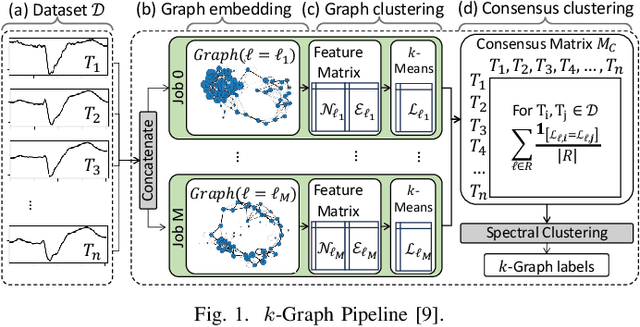
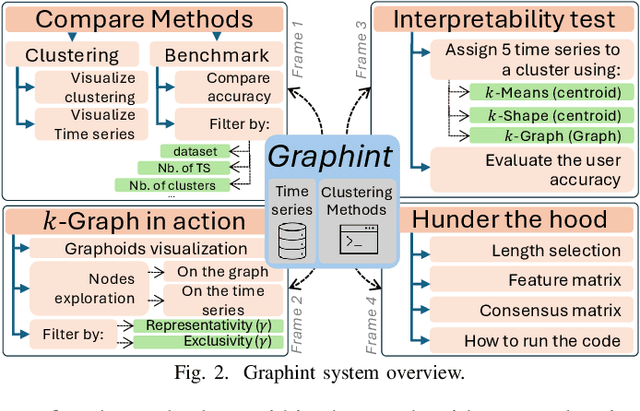
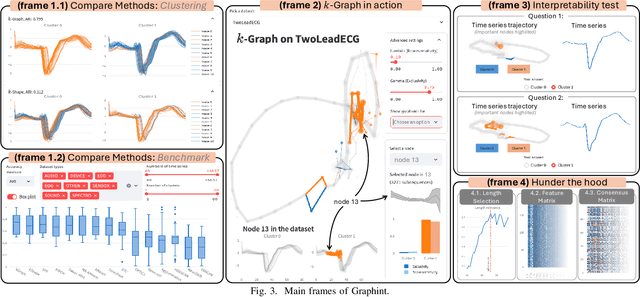
Abstract:With the exponential growth of time series data across diverse domains, there is a pressing need for effective analysis tools. Time series clustering is important for identifying patterns in these datasets. However, prevailing methods often encounter obstacles in maintaining data relationships and ensuring interpretability. We present Graphint, an innovative system based on the $k$-Graph methodology that addresses these challenges. Graphint integrates a robust time series clustering algorithm with an interactive tool for comparison and interpretation. More precisely, our system allows users to compare results against competing approaches, identify discriminative subsequences within specified datasets, and visualize the critical information utilized by $k$-Graph to generate outputs. Overall, Graphint offers a comprehensive solution for extracting actionable insights from complex temporal datasets.
$k$-Graph: A Graph Embedding for Interpretable Time Series Clustering
Feb 18, 2025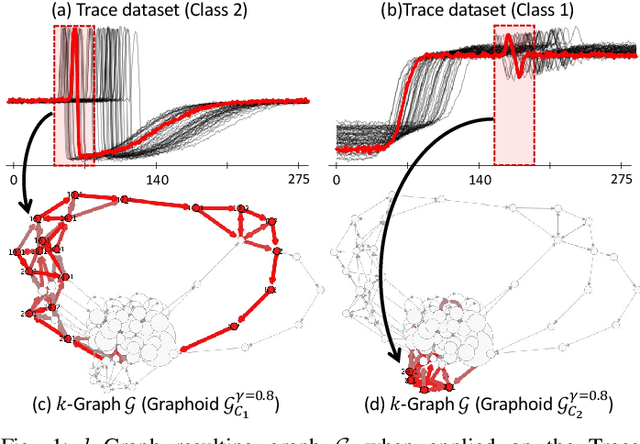


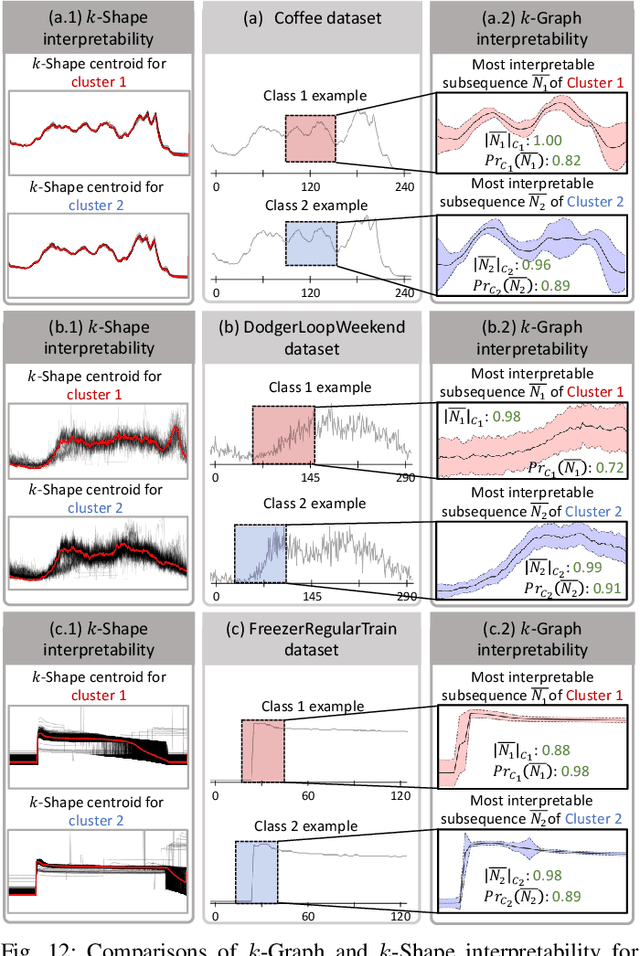
Abstract:Time series clustering poses a significant challenge with diverse applications across domains. A prominent drawback of existing solutions lies in their limited interpretability, often confined to presenting users with centroids. In addressing this gap, our work presents $k$-Graph, an unsupervised method explicitly crafted to augment interpretability in time series clustering. Leveraging a graph representation of time series subsequences, $k$-Graph constructs multiple graph representations based on different subsequence lengths. This feature accommodates variable-length time series without requiring users to predetermine subsequence lengths. Our experimental results reveal that $k$-Graph outperforms current state-of-the-art time series clustering algorithms in accuracy, while providing users with meaningful explanations and interpretations of the clustering outcomes.
Longitudinal Modularity, a Modularity for Link Streams
Aug 29, 2024



Abstract:Temporal networks are commonly used to model real-life phenomena. When these phenomena represent interactions and are captured at a fine-grained temporal resolution, they are modeled as link streams. Community detection is an essential network analysis task. Although many methods exist for static networks, and some methods have been developed for temporal networks represented as sequences of snapshots, few works can handle link streams. This article introduces the first adaptation of the well-known Modularity quality function to link streams. Unlike existing methods, it is independent of the time scale of analysis. After introducing the quality function, and its relation to existing static and dynamic definitions of Modularity, we show experimentally its relevance for dynamic community evaluation.
Large Language Models and Knowledge Graphs: Opportunities and Challenges
Aug 11, 2023Abstract:Large Language Models (LLMs) have taken Knowledge Representation -- and the world -- by storm. This inflection point marks a shift from explicit knowledge representation to a renewed focus on the hybrid representation of both explicit knowledge and parametric knowledge. In this position paper, we will discuss some of the common debate points within the community on LLMs (parametric knowledge) and Knowledge Graphs (explicit knowledge) and speculate on opportunities and visions that the renewed focus brings, as well as related research topics and challenges.
Mapping-equivalence and oid-equivalence of single-function object-creating conjunctive queries
Jan 12, 2016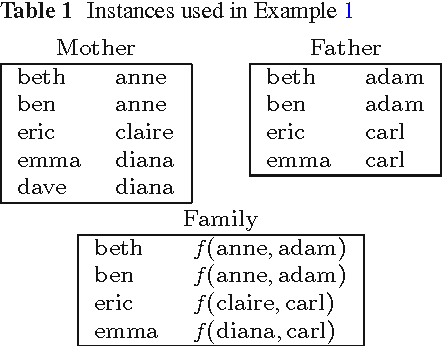
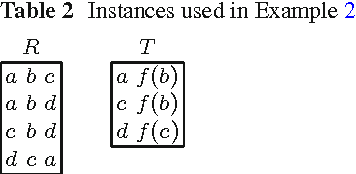
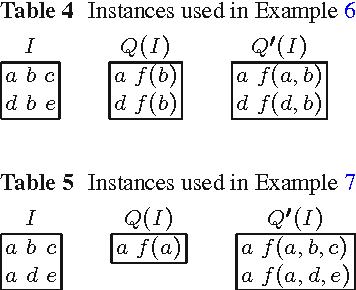
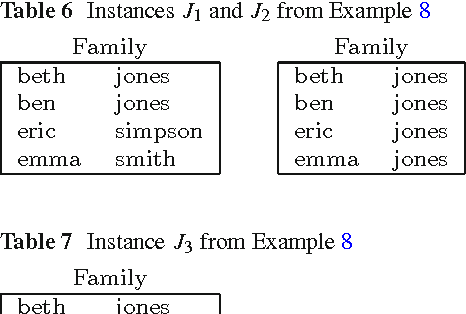
Abstract:Conjunctive database queries have been extended with a mechanism for object creation to capture important applications such as data exchange, data integration, and ontology-based data access. Object creation generates new object identifiers in the result, that do not belong to the set of constants in the source database. The new object identifiers can be also seen as Skolem terms. Hence, object-creating conjunctive queries can also be regarded as restricted second-order tuple-generating dependencies (SO tgds), considered in the data exchange literature. In this paper, we focus on the class of single-function object-creating conjunctive queries, or sifo CQs for short. We give a new characterization for oid-equivalence of sifo CQs that is simpler than the one given by Hull and Yoshikawa and places the problem in the complexity class NP. Our characterization is based on Cohen's equivalence notions for conjunctive queries with multiplicities. We also solve the logical entailment problem for sifo CQs, showing that also this problem belongs to NP. Results by Pichler et al. have shown that logical equivalence for more general classes of SO tgds is either undecidable or decidable with as yet unknown complexity upper bounds.
 Add to Chrome
Add to Chrome Add to Firefox
Add to Firefox Add to Edge
Add to Edge